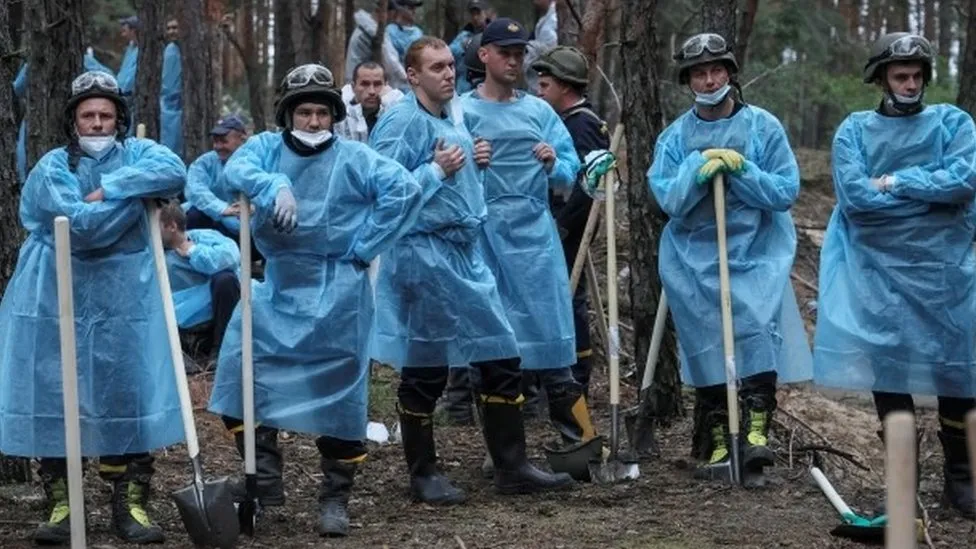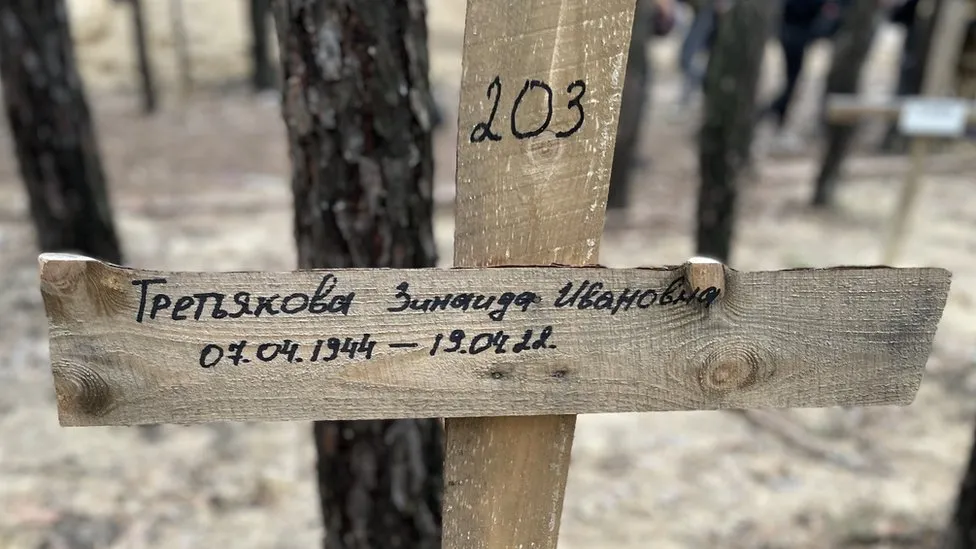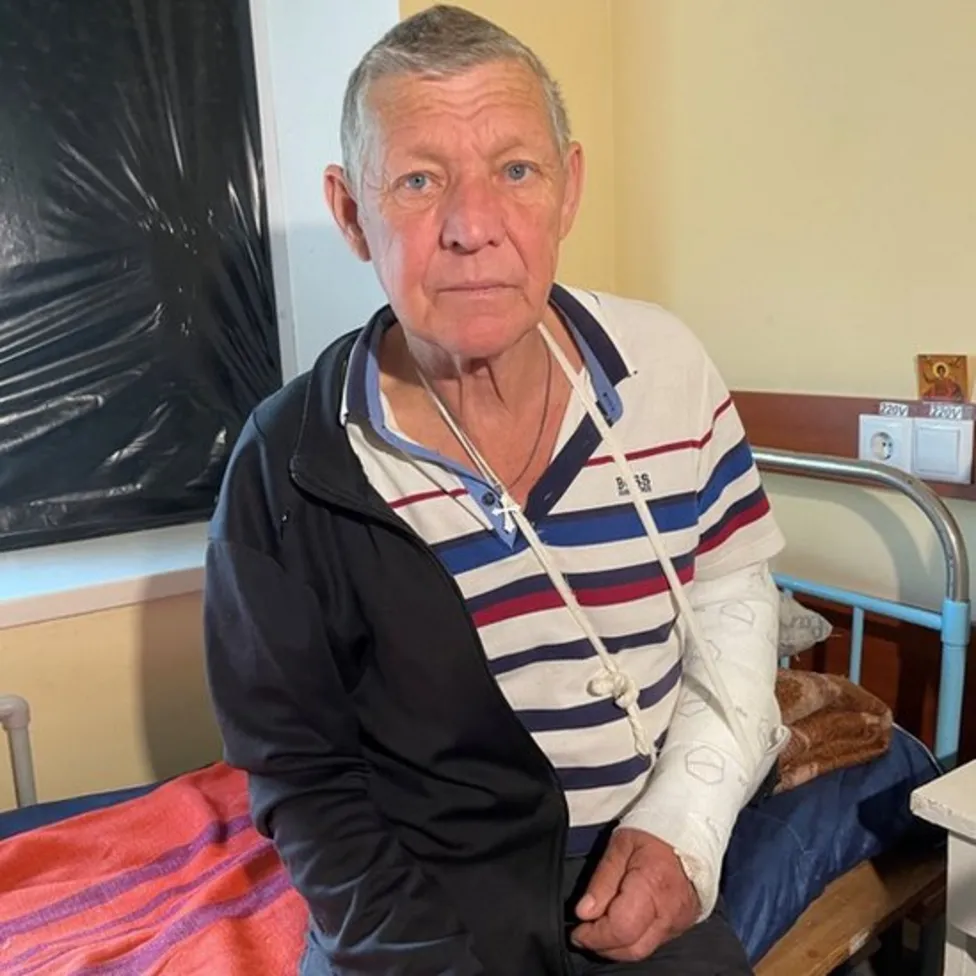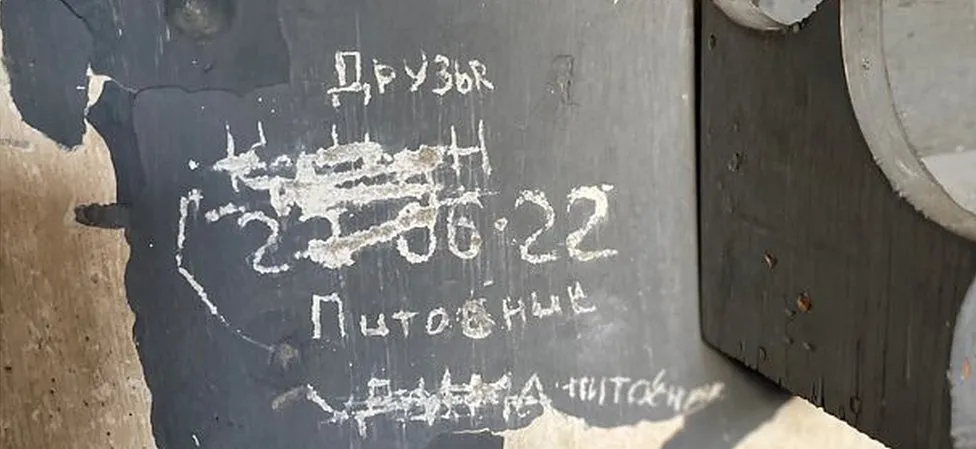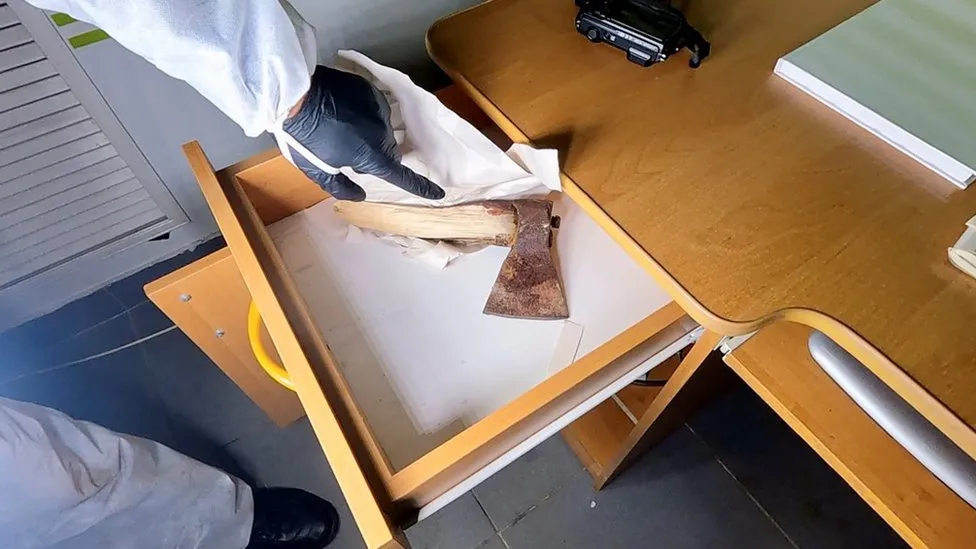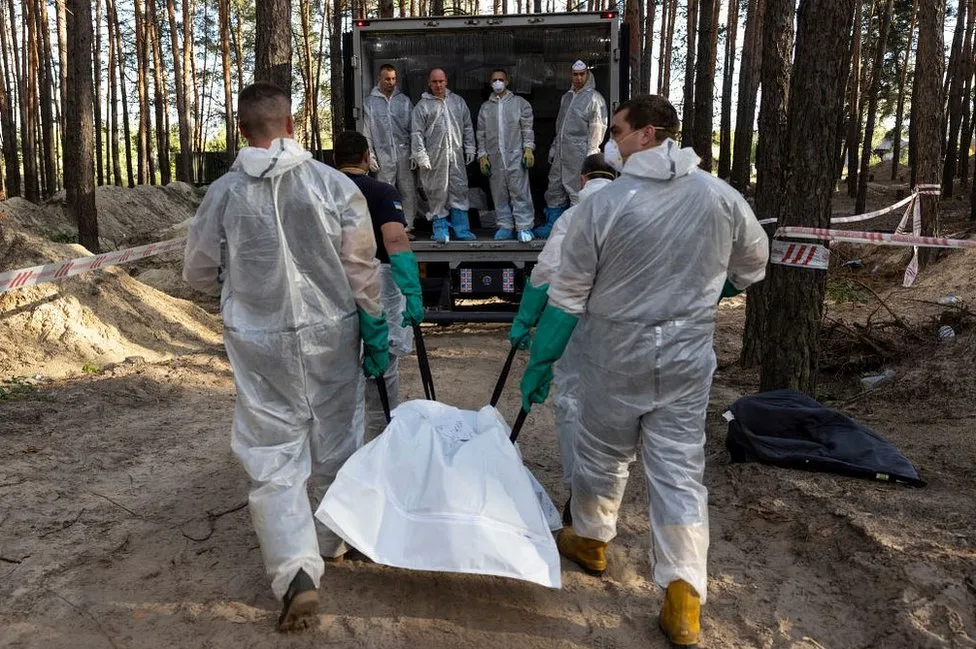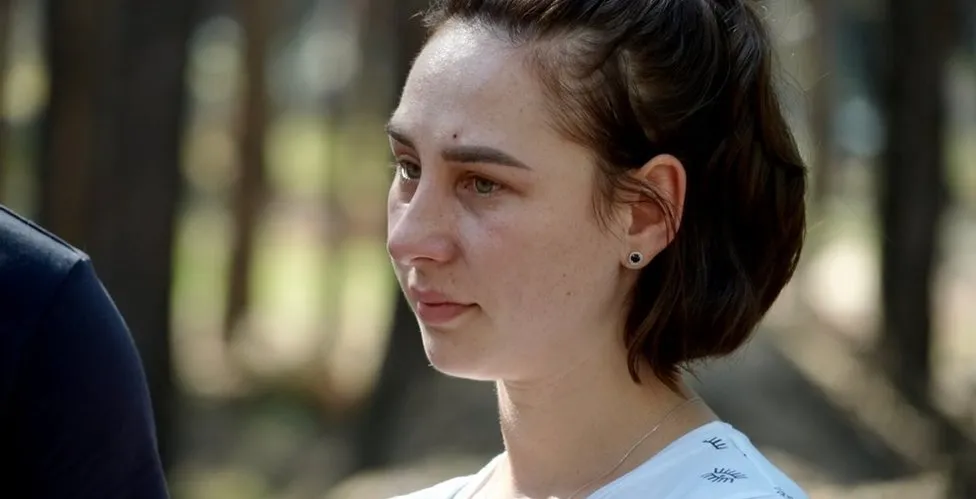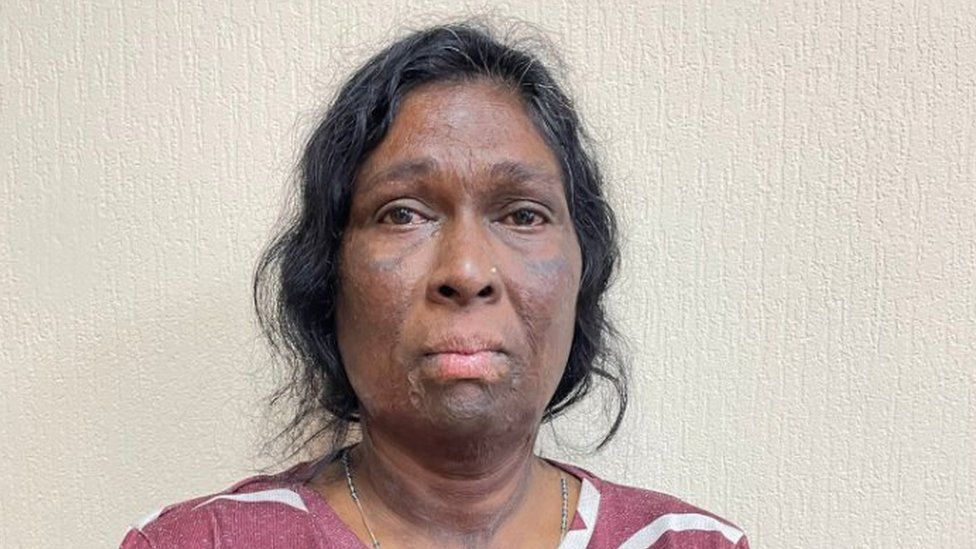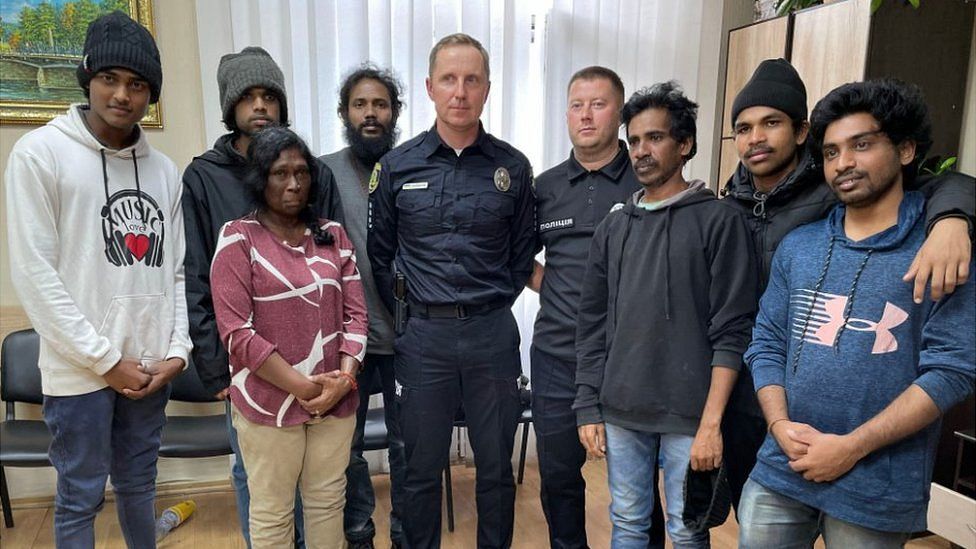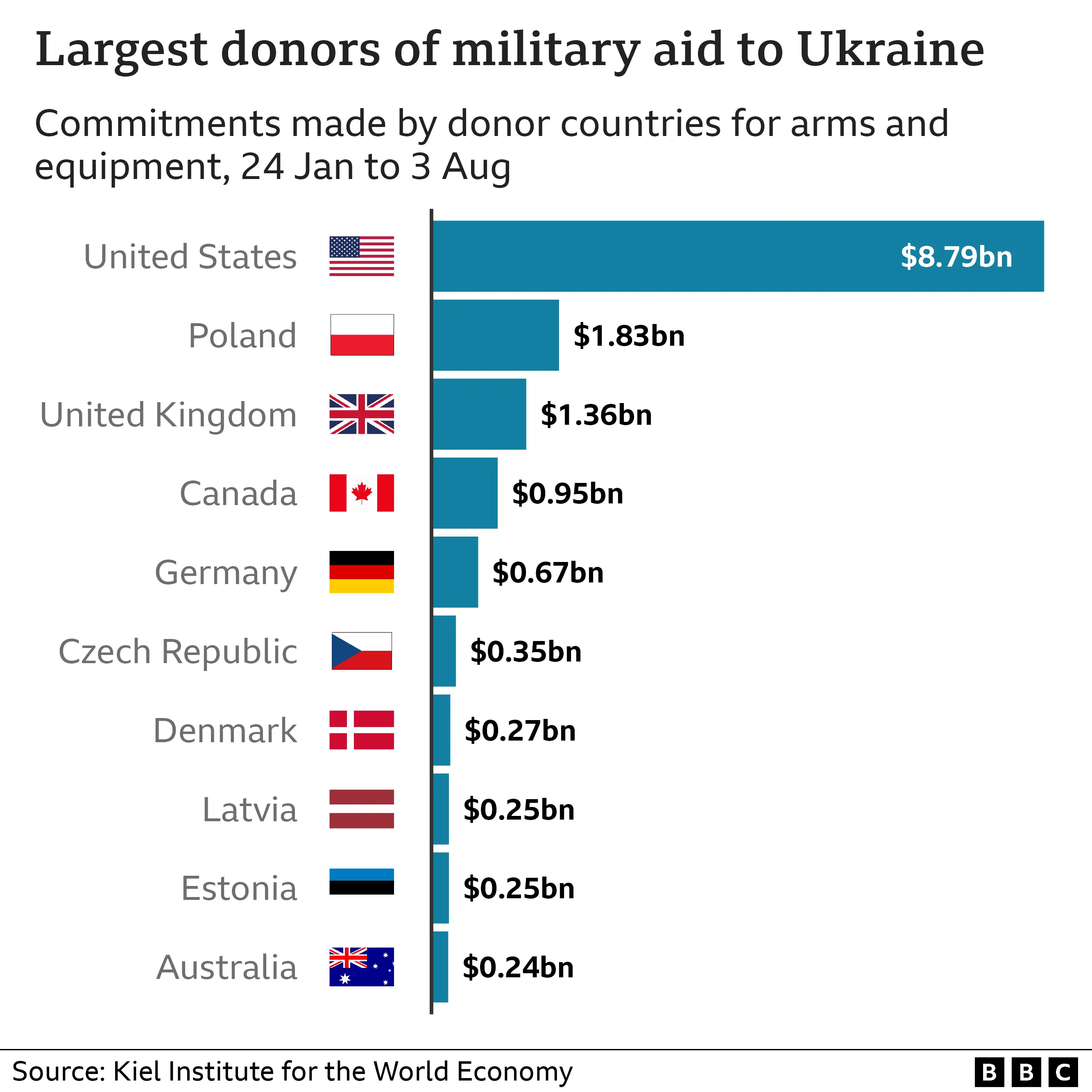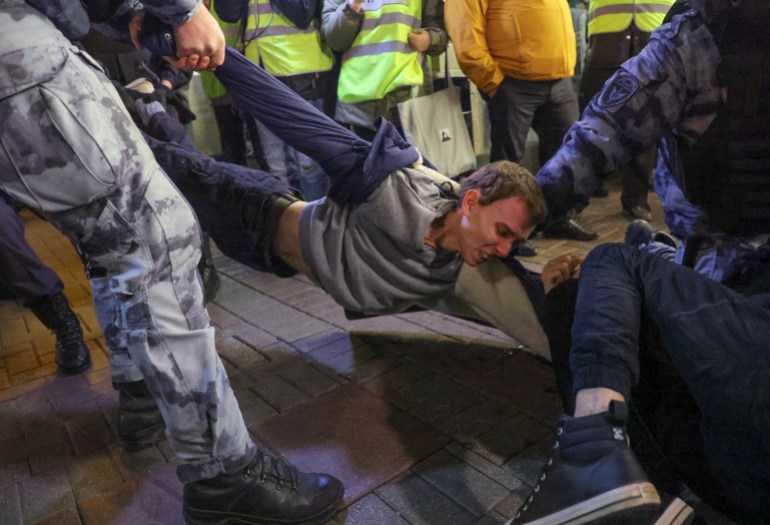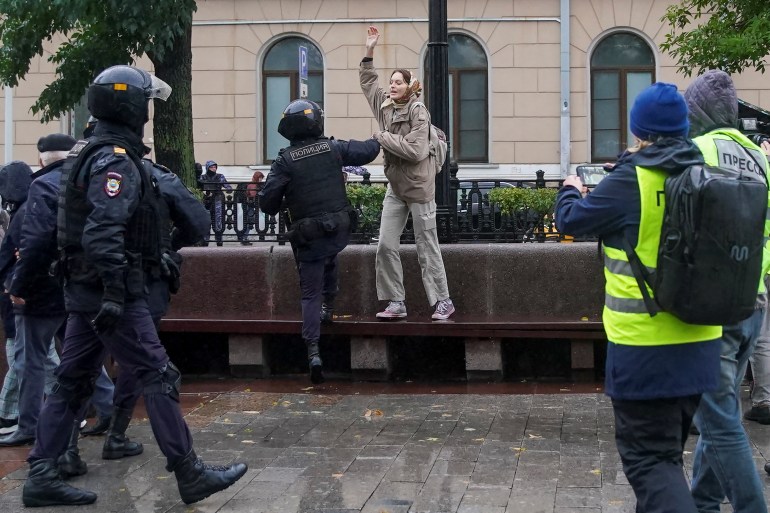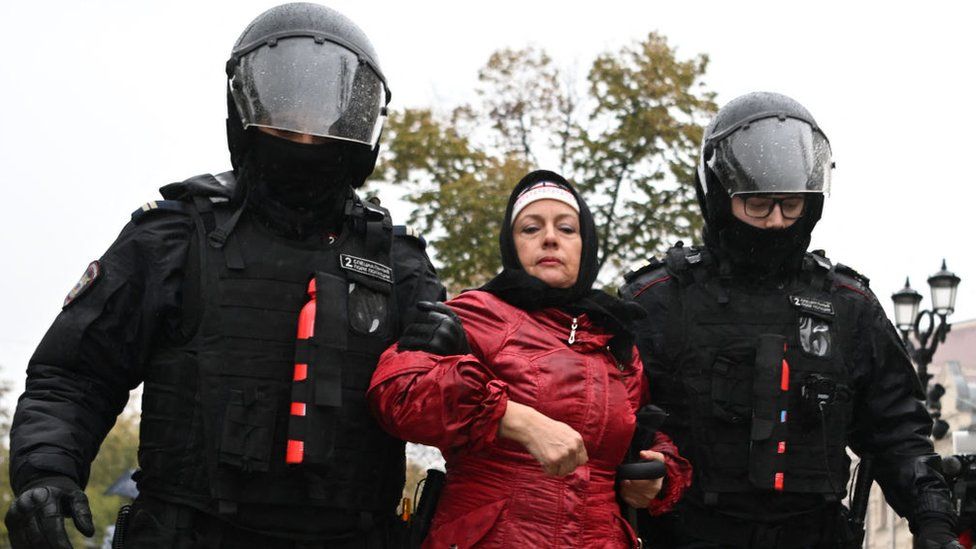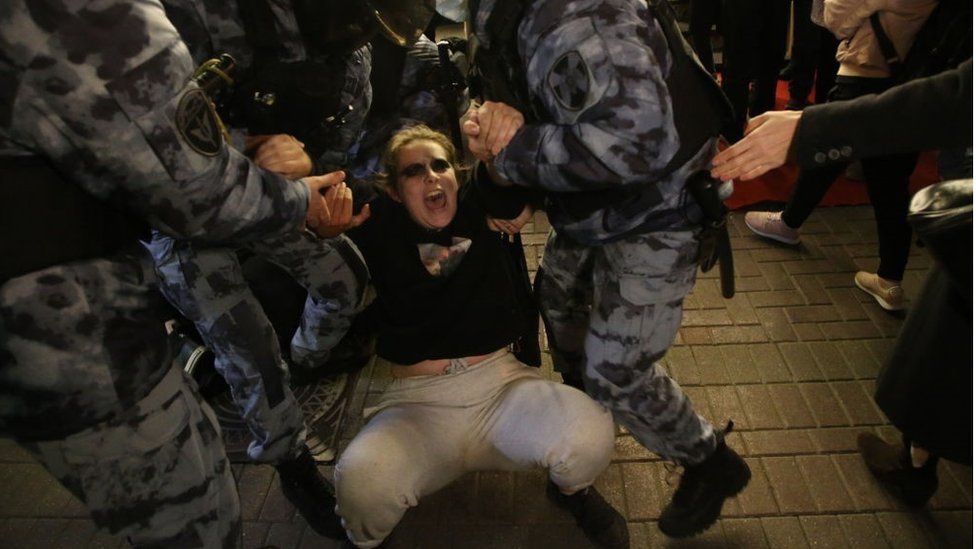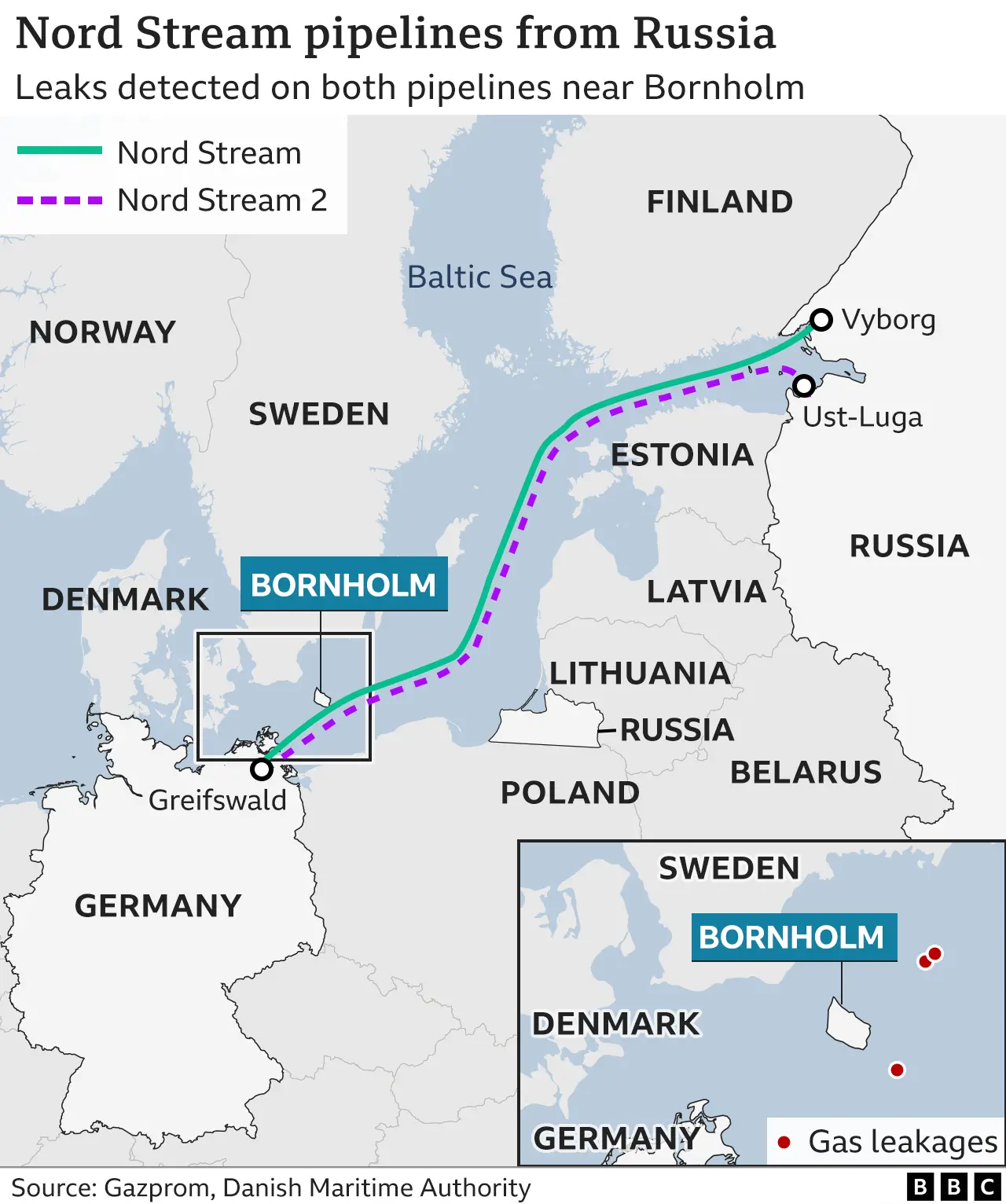Ukraine war: Russian pop megastar Alla Pugacheva condemns conflict
By Laurence Peter
BBC News
Published 18 September
Alla Pugacheva, 22 Mar 11
IMAGE SOURCE,GETTY IMAGES
One of Russia's most popular singers, Alla Pugacheva, has called on the Russian authorities to declare her a "foreign agent", in solidarity with her strongly anti-war husband Maxim Galkin.
A showbiz star too, he was labelled a "foreign agent" on Friday after condemning Russia's attack on Ukraine.
On social media Pugacheva called her husband "a true incorruptible Russian patriot, who wants... an end to our lads dying for illusory aims".
She has been a big star for decades.
She said the Kremlin's "illusory aims" in Ukraine "make our country a pariah and the lives of our citizens extremely difficult".
Galkin, a comedian, TV presenter and singer, wanted "prosperity for his motherland, peace, free speech", she added.
Alla Pugacheva meets President Putin, 22 Dec 14
IMAGE SOURCE,GETTY IMAGES
Image caption, President Putin greeted Alla Pugacheva in the Kremlin in December 2014
The label "foreign agent" has been applied by the Russian government to various media organisations, campaign groups and individuals openly critical of Kremlin policies.
line
Megastar speaks out
Analysis by Steve Rosenberg, Russia editor
Alla Pugacheva has been a musical megastar here for decades. First, in the Soviet Union, where she began her career in the 1960s; then, after the fall of the USSR, in Russia.
She is a hugely popular and well-respected artist, which makes her public comments about Russia's offensive in Ukraine big news.
Her assertion that "our lads are dying for illusory aims that make our country a pariah and the lives of our citizens extremely difficult" is likely to infuriate the Kremlin.
It remains to be seen whether it will have any effect on Russian public opinion over what the Kremlin still calls its "special military operation".
line
Pugacheva and Galkin went to Israel in late March, a month after the Russian invasion, and Pugacheva returned to Russia late last month with her children.
In early September President Vladimir Putin's spokesman Dmitry Peskov said of Galkin: "Our paths have clearly diverged - he has made very bad statements."
Galkin condemned Russian troops' alleged atrocities and said there could be no justification for the Ukraine invasion.
Artemy Troitsky, a leading figure in Russian music who left the country in 2014 because of his opposition to Vladimir Putin and now lives in Estonia, told the BBC Pugacheva's intervention was significant.
"Alla Pugacheva is the biggest pop star in Russia in the past almost 50 years," he said.
"Her fame is monumental and she's a legendary figure. I think this is something that many people have expected her to do some time ago because her husband, Maxim Galkin, he's made his anti-war statements already many times and several months ago.
"I think this is her first ever strong political statement and this in itself, of course, is quite shocking for the people in Russia. I think she's not the only one who may turn the public opinion. The obvious wrongdoings of the Russian army and the offensive of the Ukrainian army and the worsening economic situation and so on, all those factors they work against Putin and against the war.
"But I think that morally and emotionally this statement of Alla Pugacheva is maybe one of the most strong efforts in these directions."
Russia says it is fighting neo-Nazis in Ukraine - a claim widely dismissed - and that it is threatened by the Nato alliance's strong relations with Ukraine.
Since the invasion on 24 February, the UN has recorded at least 5,718 civilian deaths, with 8,199 injured, and more than seven million Ukrainians have been recorded as refugees across Europe.
The actual civilian death toll is believed to be thousands higher. Tens of thousands of combatants have been killed or injured.
Russia, a global energy supplier, is locked in an economic struggle with the West which imposed sweeping sanctions in response to the invasion.
Ukraine war: The Russians risking freedom to protest against Putin's invasion
By Will Vernon
BBC News, St Petersburg
Published 4 days ago
Two members of the secretive Feminist Anti-War Resistance group in Russia
Image caption, These members of the secretive Feminist Anti-War Resistance group in Russia say the war in Ukraine is "senseless"
It is 03:00 in St Petersburg and the streets are deserted. But in one tiny flat in the centre of the city, two activists are wide awake preparing to do something that can be very dangerous in Russia - stage an anti-war protest.
The pair agreed to meet us, but requested that we protect their identities.
"We do it anonymously, at night, in quiet areas, and we hide from CCTV cameras," says one activist, who goes by the nickname Mitya.
"We always have our hoods up and we wear masks. We make our posters in gloves and we hang them up in gloves," explains the other, who we will refer to as Vorobei.
The Feminist Anti-War Resistance is a secretive protest group that sprang up on the second day of Russia's invasion of Ukraine.
When we meet Mitya and Vorobei, their protest has taken the form of an anti-war message spray-painted on the pavement outside a school. It is part of a series of actions targeting mothers - who may one day have to send their sons off to war.
The activists tell me they were motivated to join the group after being shocked at Russia's actions in Ukraine.
"The war is horrific," says Mitya. "It's a completely senseless, imperialist war that should never have happened. It's all about the vanity of our president, whom we didn't even elect."
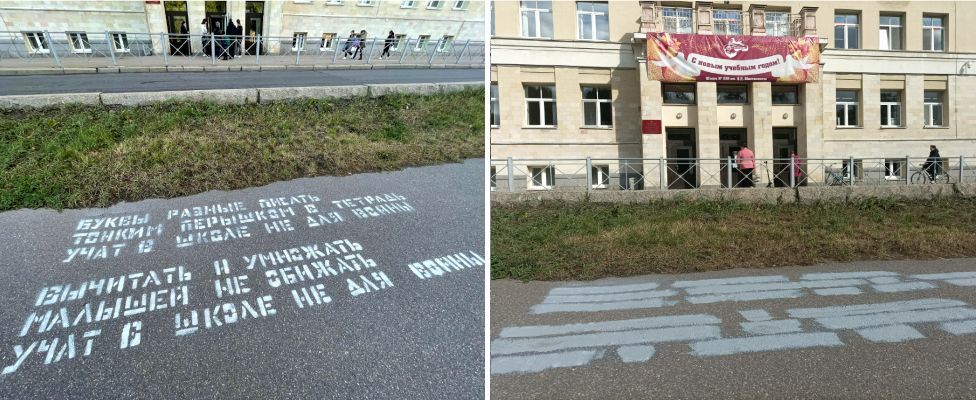
Image caption, Anti-war graffiti painted on a street near a school in St Petersburg lasted just hours before it was painted over
The next morning, we set off to inspect the graffiti that Mitya and Vorobei had painted in front of the school. It is a crisp, clear morning in St Petersburg, and the anti-war message is easily visible to dog walkers in the morning sunshine. But it survived just a few hours before it was painted over.
Vorobei says the group hopes the demonstrations will attract others: "If someone was indifferent before, if they see our poster or sticker, maybe that person will decide they don't support the war."
Being an anti-war activist in Russia is dangerous. Rights groups say there have been more than 16,000 detentions across the country for anti-war actions. Very few people now publicly oppose the war. Those who do speak out risk arrest or losing their job, university place or business.
"There were [street] protests against the war in the first week," Vorobei explains.
"They were all broken up in the most violent way - the police use tasers, batons, there's complete helplessness. And then you might get tortured in the police station. It's absolutely terrifying," says Mitya.
The authorities say the vast majority of Russians support what the Kremlin refers to as the "special military operation" in Ukraine, and they deny allegations that activists are persecuted.
It is very difficult to gauge how many people in Russia oppose the war. Both state polls and those conducted by independent researchers put the level of public support for the military campaign at around 70%.
However, critics say opinion polls cannot be trusted in an authoritarian system like Russia, as people often give a dishonest response for fear of repercussions. Russians are often reluctant to talk about politics openly with strangers.
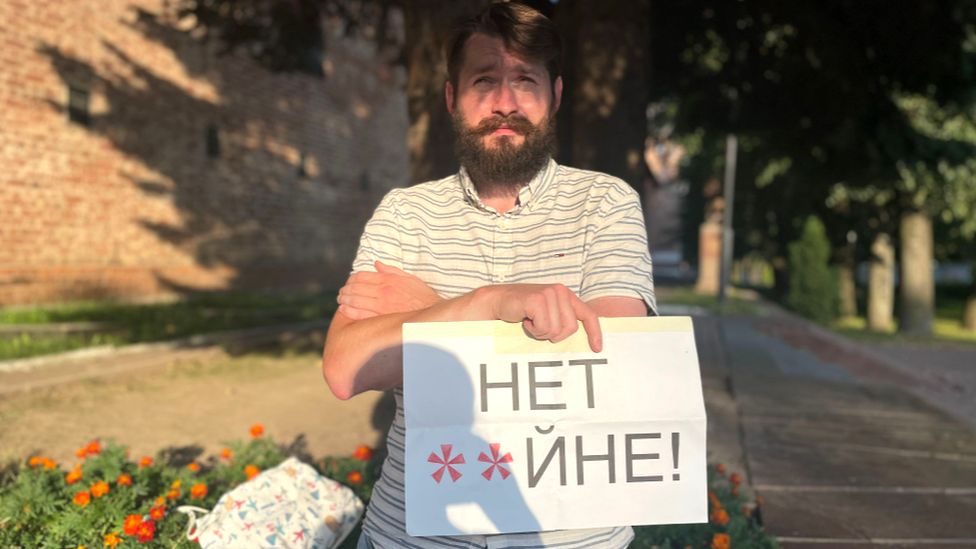 Vitaly in Smolensk
Vitaly in Smolensk
Image caption, Vitaly began his daily protest when Russia invaded Ukraine in February, and has missed only three days since
Vitaly, though, is one of those Russians who wants to talk.
We travelled to Smolensk, a city in western Russia, to meet him.
The 32-year-old former aircraft engineer has staged a public protest in the centre of Smolensk every day since the war began.
In seven months, he has missed just three days - when he was either in jail or at a funeral.
"Why do I go out every day? In order to create a chain reaction of protest," he says.
Vitaly has been arrested, fined and even brutally beaten. But he carries on, and tries to convince others to join him. So far, nobody has. We walk with him to the city centre, where he stands under a fir tree with his anti-war placard.
"Has anything changed? No, but that doesn't mean I'm upset and I'll stop. At the moment I'm still able to do something, I'm not disillusioned yet."
Vitaly's placard reads in Russian: "No to the war!" But he has replaced the first two letters of the word "war" with asterisks.
In March, shortly after the invasion began, the Russian parliament passed a series of new laws making it illegal to use the words "war" or "invasion" in relation to Russia's military campaign in Ukraine.
Doing so could land you in prison.
"The fear is very high," he says, wearily. "I have no solution for how to fight this fear. I understand it completely - people have children, jobs. We are silent, and we are afraid. This is what we need to work on - overcoming the fear."
While we talk, a woman angrily confronts him. She snatches his sign and rips it to pieces, bellowing that he is "selling the Motherland for money".
Vitaly carefully picks up the pieces of his sign, then pulls another from his rucksack. He always carries a spare - just in case.
People in the western Russian city of Smolensk walk past a sign that reads: "We don't abandon our own"
Image caption, A billboard in Smolensk displays the pro-war "Z" symbol with the words: "We don't abandon our own"
I stop passers-by to ask whether they support Vitaly. Many are too scared to speak openly about the war, and almost everyone refuses to give their name.
One woman tells me she totally disagrees with Vitaly: "Russia is doing the right thing [in Ukraine]. Our victory should be total and final."
But many people in Smolensk clearly support his anti-war stance. We see several locals stop to chat, shake his hand and offer kind words.
A young mother called Kira, out walking with her daughter, agrees to speak to me. "We support that young man," she tells me. "The war is very bad. It won't bring anything good, not for our country, or for any other."
Not everyone has been as lucky as Vitaly, who has managed to avoid a long prison sentence - so far. Back in Moscow we went to meet Elena, who wanted to tell us about her son. She shows me his room, untouched since his arrest: "I really miss him. I miss talking to him."
Dima Ivanov, 23, is a gifted student from Moscow State University. He ran a popular social media channel, where he posted anti-war material. In April, he was arrested and given serious criminal charges.
He faces between five and 10 years in prison. In Russia, over 99% of criminal cases end in a guilty verdict.
Russian anti-war protester Dima Ivanov with his lawyer Maria Eismont
Image caption, Russian anti-war protester Dima Ivanov (left) with his lawyer Maria Eismont
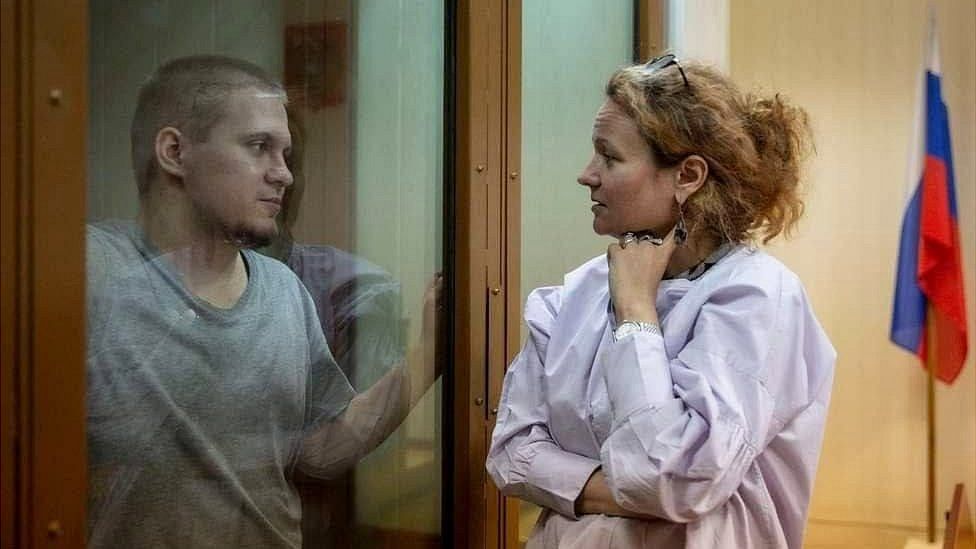
Hundreds of political activists have left Russia since the military operation began in February. "I wanted him to leave," says Elena, "but he always refused.
He said 'this is my country, why should I leave? I want things to be better here'."
Elena begins to cry. "I didn't want him to end up in prison... it's very difficult for me to think about him suffering."
Amnesty International has declared Dima a "prisoner of conscience".
His mother tells me conditions in the detention centre where Dima is awaiting trial are poor. She reads a letter he has written to her, describing his cell: "It's damp, it's mouldy and the toilets and sinks are broken."
While few in Russia openly voice their opposition to the war, as the conflict drags on and casualties mount, the Kremlin will be uneasy about the potential for more dissent.
Ukraine war: 'What's happening in Russia now is total fear'
By Sarah Rainsford
Eastern Europe correspondent, Vilnius
Published 3 days ago
Police officers detain a woman in Moscow on 21 September 2022, following calls to protest against partial mobilisation announced by President Vladimir Putin
IMAGE SOURCE,GETTY IMAGES
Image caption, Russian President Vladimir Putin's order for partial mobilisation led to protests in Moscow
In the centre of the Lithuanian capital Vilnius, a large banner is taped to a tall building, above a Ukrainian flag, that reads: "Putin, the Hague is waiting for you."
On city buses, electronic displays flick between announcing their destination and declaring "love" for Ukraine with little hearts.
This week Lithuania - together with Latvia, Estonia and Poland - banned all Russian tourists, arguing they should not be enjoying democracy and freedom in Europe while their government attacks those very values in Ukraine.
The move has raised concerns among Russian opposition activists already abroad.
"It's strange to ban people for being Russian, whether or not they support Putin's regime," argues Anastasia Shevchenko, an activist who spent two years under house arrest for protesting against the Russian president.
When Russia invaded its neighbour, she was serving a suspended sentence and one wrong move, even an anti-war comment, could have put her behind bars.
But Anastasia could not bear to be silenced, so she squeezed her family's life into a couple of cases and they fled in the middle of the night for Lithuania.
Anastasia Shevchenko
Image caption, Anastasia Shevchenko left Russia for Lithuania after her son was asked to write a letter wishing Russian soldiers victory
"What is going on in Russia now is like total fear," Anastasia tells me, in Vilnius. "So many people are frightened because we know they can do anything. It's not only prison, or fines: you can be killed or poisoned. It's like a huge prison. All the country."
Since we spoke, Vladimir Putin has declared a partial mobilisation of Russian reservists - the first real test of support for his invasion. The early signs do not look good.
Protesters came out in several cities shouting "no to war!" and even "Putin to the trenches!". More than a thousand people were detained and some were then served with call-up papers at the police station.
But even more Russians are heading for the border by any route left to them.
While queues to enter Finland are growing, Latvia and Estonia both say escaping enlistment is not grounds for asylum. Lithuania will consider cases individually, but the prime minister clarified that it was "not the duty of other countries to save Russians fleeing mobilisation".
A banner on a building in central Vilnius, Lithuania, reads: "Putin, the Hague is waiting for you"
Image caption,
A building in central Vilnius, Lithuania, displays an anti-Putin message above the Ukrainian flag
Ukrainians have no sympathy with those now protesting against the draft, if those same people did not come out against the killing of Ukrainian civilians.
Some see even the most persecuted Russian activists as cowards, because the risk they face for resisting President Putin is nothing compared to being bombarded by his military.
Those activists, however, insist that it is not that simple.
"Of course, we feel this responsibility. We should have used the opportunity to change our country," former opposition MP Dmitry Gudkov accepts.
"Putin is a war criminal, he is killing people. But how can Russians inside Russia stop Putin? It's not possible."
Mr Gudkov left Moscow well before the war, saying he was warned to go - or go to jail.
Today, all prominent Russian opposition figures are either in custody, dead or in exile.
So at a recent gathering in Vilnius, a slogan on stage called on those abroad to "be brave, like Ukraine", but the mood was subdued with a hint of helplessness.
Many are actually now looking to Ukraine to do what they could not achieve peacefully inside Russia: defeat Putin.
"I think the West should ramp-up military assistance to Ukraine, that's the only option," Mr Gudkov says.
Alexei Navalny's team agree, but go further. Since the opposition politician was imprisoned, dozens of his team have moved to Vilnius to escape prosecution as "extremists" themselves.
Leonid Volkov
Image caption, Leonid Volkov, an aide of Putin critic Alexei Navalny, is calling for Western sanctions on Russia's "war enablers"
"Putin committed his gravest mistake when he invaded Ukraine. I believe he dramatically decreased the duration of his reign," Mr Navalny's right-hand man, Leonid Volkov, tells me.
This week's call-up has confirmed that belief, as videos of men saying tearful goodbyes to their families pop up all over the country.
"No-one attacked Russia, no-one needed these separations and these deaths," Mr Volkov wrote on Twitter. "But on 24 February, a maniac led his country down a dead-end."
Mr Navalny's team have been trying to undermine support for the war via YouTube. The audience for their shows, made in Vilnius, has doubled since the invasion.
They are also pushing for more Western sanctions - not visa bans against a whole nation.
They want Ukraine's allies to look beyond President Putin's near-circle and sanction those whom Mr Volkov calls "war enablers" - a list of over 6,000 names, from judges to state journalists.
"Our call to Western governments is to sanction all those people and present them with an exit strategy: tell them what they have to do to get off the list," Mr Volkov says.
"This will create splits. Many will start to jump ship, and Putin's system can't work without them," he adds.
A woman is silhouetted against a TV screen displaying Russian President Vladimir Putin during a televised address to the nation, 21 September 2022
IMAGE SOURCE,EPA
Image caption, In a televised address this week, Vladimir Putin said he was calling up thousands of extra troops to fight in Ukraine
Russian troops have since been forced into retreat from large areas of Ukraine and President Putin has responded as usual: by escalating.
As well as the call-up, there is his threat of annexing more Ukrainian land and another nuclear warning for the West.
Russia's president has staked a huge amount on this campaign and things could well get much worse.
That leaves activist Anastasia Shevchenko struggling with a sense of guilt that she could not do more to stop him.
"I blame myself and it's not a good feeling, believe me," she admits.
But her decision to leave Russia was sealed when her son had to write a letter at his primary school to the soldiers, wishing them victory.
Instead, he told them they had no right to fight their neighbours.
"I think all we can do now as Russians is say sorry - and protest against Vladimir Putin," Anastasia says. "Because Putin personally is the reason for what's going on. Why so many people are dying."
